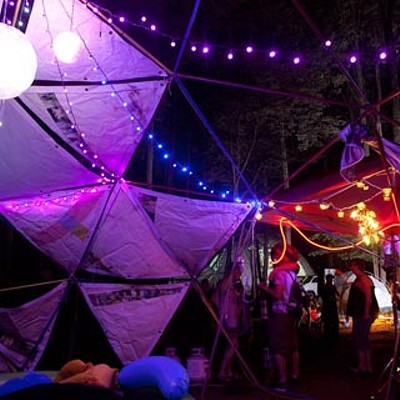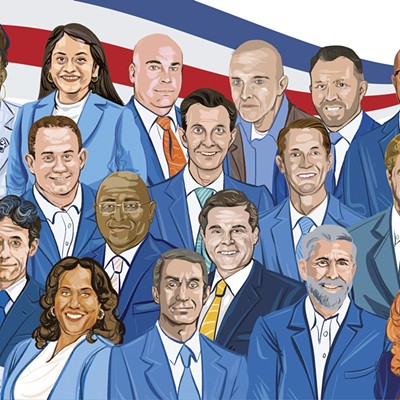Thursday, June 30, 2011
Op-ed: Dialing up expectations for the new 90.5
First, a programming note: As you may have noticed recently, we've got more City Paper staffers contributing to the pile here at Slag Heap these days. What began as essentially an opinion-with-occasional-news blog, written almost entirely by me, is morphing into a news-with-occasional-opinions blog, with contributions from various folks.
Accordingly, I'll be flagging posts -- like this one -- that offer a more opinion-driven take on current events.
On to the business at hand. Tomorrow begins the new format at WDUQ, the jazz-and-NPR station long operated by Duquesne University. Starting July 1, the station will shift to a news-driven format run cooperatively by local station WYEP and Public Media Company, a new nonprofit affiliated with a Colorado public-radio enterprise. (CORRECTION: The entity running the station, Essential Public Media, is wholly owned by WYEP. While the local station has been acting in partnership with Public Media Company, WYEP General Manager Lee Ferraro stresses that PMC, which helped facilitate the acquisition, has no input on programming decisions or other operations.) And some bruised feelings are in evidence.
Read, for example, Charlie Humphrey's take on the transition here. Humphrey has been actively involved in this transition, and I think it's safe to say he's grown weary of hearing from jazz fans outraged at losing their platform. To wit:
A recent letter to the editor in the Post-Gazette about the sale of WDUQ states that "jazz [is] inarguably the most influential cultural innovation of the 20th century." Hum. Inarguably. Well, that pretty much ends the conversation.
But I'll argue it anyway. I think the crown of cultural innovation should go to the civil rights movement, or rock and roll, or penicillin or Pee Wee Herman. What about Prince, or the Hula Hoop? What about Shirley Temple, or the Wizard of Oz? What about Elvis? I think we need an all-Elvis radio station here, and I also think it is my God-given right to have one. Porky Chedwick, where are you?
Humphrey also asserts that "Jazz radio in Western Pennsylvania is unsustainable." The proof being that: a) WDUQ's ratings drop when NPR stops and jazz starts; b) Pittsburgh doesn't sustain a lot of jazz clubs; and c) Duquesne University had to subsidize WDUQ's operations. "How can jazz listeners actually believe they are entitled to that level of subsidy from a private university?" he asks.
I'm not sure Humphrey really wants to go there. First off, NPR isn't self-sustaining either -- it receives government subsidies. And as a look at recent headlines suggests, plenty of people don't think NPR's audience should feel "entitled" to that money either.
In any case, Humphrey invites the rejoinder that his own organization, Pittsburgh Filmmakers, isn't sustainable either, since its operations depend on institutional support as well. To be honest, I'm not sure how fair that comparison is; the operative part of Humphrey's question is "from a private university." But once you start likening a decades-old musical heritage to the hula hoop, you really can't complain about the other side's unfair analogies.
A less argumentative take on the issue is provided by Katherine Fink, a former WDUQ staffer who has since moved on to grad school at Columbia, no less. Fink worked on WDUQ's news side; in fact, I suspect she'd fit in well at the station Humphrey hopes to have on the new 90.5. Even so, she expresses some misgivings about the change:
As a former news reporter and anchor at the station, it might surprise you that I’m against the loss of jazz programming at WDUQ. After all, the amount of local news content will apparently increase, according to Essential Public Media, the new owner. I appreciate that the station will have a local interview/call-in show, and a weekly program dedicated to local public affairs issues ... But it remains to be seen whether the changes EPM will bring will result in better community service.
Fink goes on to take issue with some of the claims being made by proponents of the new format. But the more interesting part of her argument is philosophical:
Some proponents of the new WDUQ have also argued that it makes sense to get rid of jazz because it has a smaller audience. Whether noncommercial broadcasting should try to appeal to mass audiences is a debate that’s older than the U.S. public broadcasting system itself. Personally, I side with the original Carnegie Commission, whose recommendations formed the basis of the Public Broadcasting Act of 1967. The Commission believed that public broadcasting should promote diversity--that it should serve many niche audiences, the ones that commercial broadcasters tend to ignore. Bill Siemering, one of NPR’s founders, wrote in the organization’s original mission statement that public radio should "speak with many voices” and “celebrate the human experience as infinitely varied." It’s in that spirit that many public radio stations adopted “checkerboard” formats -- like news/jazz, or news/classical, with all kinds of other shows on weekends -- to serve multiple smaller audiences with varied interests.
The checkerboard format is on its way out; WDUQ’s is just the latest example.
For me, this gets at exactly what I think is at stake with the new station ... and why I'm not losing too much sleep over the old one.
For my tastes, the problem with WDUQ is that it wasn't enough of a checkerboard. Even too much of the jazz sounded the same: You weren't likely to tune in and hear John Zorn or Sun Ra, for example, at 90.5. WDUQ did have some musical programming that wasn't mainstream jazz: For example, it sported a weekly Indian music broadcast (which will be included on the new station). But I'd be much more upset by WDUQ's disappearance, I think, if it'd served a whole bunch of different niches, as opposed to just a few.
That said, Fink's post points up with the part of Humphrey's argument that gives me pause. That would be the part where he cites WDUQ's Arbitron ratings as evidence for the wisdom of a new format:
According to January 2010 Arbitron ratings (Arbitron is the company most used to monitor radio usage), WDUQ was ranked No. 5 among all local radio stations in the market during morning drive time, when NPR's Morning Edition is aired. During morning drive time, 90.5 is right up there with behemoths like WDVE and KDKA.
Now, what is WDUQ's ranking at 10 a.m., when jazz is in full swing? No. 15. You can practically hear radio receivers being turned off around Western Pennsylvania when jazz follows news and information.
Well, shit. If that's your standard, maybe the new WDUQ should adopt the BOB-FM format: Mixing Def Leppard and Sheryl Crow into the same playlist has done wonders for 96.9, which is owned by my corporate overlords here at Steel City Media.
Yes, yes: Public radio should serve a broad swath of the public. But it can be a fine line between that and the market-driven logic that produces so much of the dreck on the rest of the radio dial.
And let's face it: While we all love This American Life and Morning Edition, it's a little harder to make the case that airing, say, Car Talk or The Splendid Table is a sacred trust. Looking over the shows currently on the Essential Public Media program schedule, I can see several I'd happily jettison in favor of, say, Democracy Now.
Yeah, I'm an unrepentent lefty. So it's no surprise I'd prefer Amy Goodman to Lynn Rossetto Kasper. But if you believe, as Fink does, that public radio should try to serve a variety of niches, then it's sad to learn I'm only a little better off with EPM's latte-liberal programming than I was with WDUQ.
Of course, the new 90.5 doesn't even exist yet. I mean, the FCC hasn't yet actually approved the transfer of WDUQ's license to the new owners. It's way too soon to judge its effectiveness.
Like Humphrey, I guess, I find it tiresome that the jazz-versus-not-jazz argument has sucked up all the oxygen in this debate. What's more, I've worked on projects with Humphrey before, and know him to be a bright, sincere guy. Hell, City Paper is a media partner with the PublicSource media initiative he's launching along with the new station. (More about that sometime soon.) It's true that the programming schedule is real light on local offerings -- most of what's there was already running on either WDUQ or WYEP. But that will change -- in large part because of PublicSource, which Humphrey is pledging will help deliver aggressive, long-form journalism.
Let's hope so. As Fink herself graciously concludes her blog post:
I know there’s a lot of room for improvement at WDUQ. Despite my misgivings, I do wish EPM success. But please, let’s not define success in terms of how well the new WDUQ mimics the formats of other big-city NPR news stations, or how large its audience is.
Exactly.
Tags: Slag Heap










